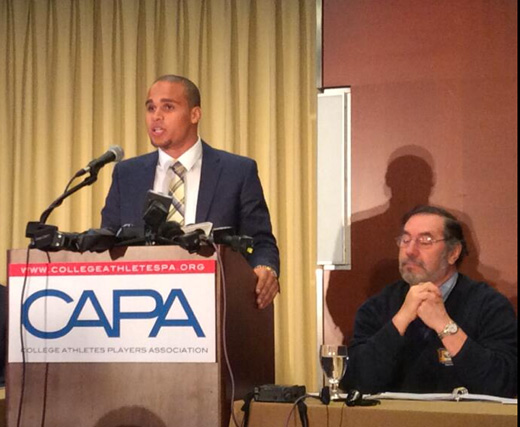
CHICAGO (PAI) — Unions hailed a National Labor Relations Board official’s ruling on March 26 that athletes at private universities nationwide – such as Northwestern, where the case occurred – are employees of the institutions and thus can unionize.
NLRB Chicago Regional Director Peter Sung Ohr said Northwestern’s football players can hold a board-sanctioned election on whether to unionize with the College Athletic Players Association (CAPA), a fledgling union whom the Steel Workers back and provide lawyers for.
If Ohr’s ruling stands, it would be a landmark victory for college athletes, whose scholarships are now awarded at the whim of their institutions and who have little or no protection against on-the-job injuries or aid to help them pay their way through school and graduate when scholarships end. Ohr’s ruling would let them organize and bargain for such gains.
CAPA and USW President Leo Gerard hailed Ohr’s ruling for those reasons. Both said it would particularly aid football and basketball players at big Division I programs, such as Northwestern’s, to demand better working conditions, especially in treating injuries on the job and medical treatment for permanent disabilities that playing football causes.
“NCAA sports is professional,” CAPA President Ramogi Huma, a former UCLA player, told ABC News the week before. “The players are paid to play. They receive at Northwestern a scholarship that’s worth over $60,000 per year, in return and on the condition they play football. That’s an employee-employer relationship.”
“People who work hard deserve fair treatment…whether it’s on a playing field or anywhere else,” added AFL-CIO President Richard Trumka, a former college footballer.
Opinion polls show most college football fans deny players are employees. But at least one prominent sports columnist has gone to bat for the players, pointing out they’re paid, through scholarships, earn money for their college and university employers, and must devote most of their time on campus to their jobs – football or basketball – and not their studies.
CAPA organized the players around several key issues, notably job-related injuries, led by concussions. It says it would bargain for guaranteed medical coverage for injury expenses and post-injury treatment, especially of traumatic brain injury, as well as injury prevention measures. It also plans to bargain over establishing trust funds to help former players pay tuition and expenses to complete their degrees after their scholarships end.
Gerard called Ohr’s decision “a tremendous victory” for all college athletes, who “generate tens of millions of dollars each year for their institutions, yet still are in constant danger of being out on the street with one accident or injury.” He too said negotiating medical coverage was the key issue that led to the unionization drive at Northwestern.
“These athletes have a right to expect the same fair treatment that all Americans should expect, and that when they work hard and devote years of their lives in service to an institution, they deserve certain basic protections in return. None of them should live in fear of losing their scholarships in an instant, nor should they be left without health care after debilitating injuries. Our union has been proud to support these players from day one, and we couldn’t be happier with the result.”
Ohr said the players satisfied key legal points: That the employer pays them for their work, and the employer profits from it. His ruling also gives an idea of the scope of big-time college athletics. Northwestern, which is known for its academics, gave full-ride scholarships to 85 of the 131 football team members, and each scholarship is worth $61,000 yearly. In return, the university earned more than $30 million during the football season and cleared a profit on football of approximately $9 million, Ohr said.
Northwestern tried several arguments to convince Ohr the football players can’t unionize. He bought none of them.
When it argued the players’ prime purpose is to attend class, Ohr retorted they spent more hours a week on football, and that the employer could arbitrarily fire them – though Ohr didn’t use that word – by yanking their scholarships.
The university argued the players are temps, whose scholarships last at most five years. It compared them to part-time student janitors at a San Francisco art school several years ago. Ohr replied the janitors – whom the board did not allow to unionize – had high turnover due to the fact that their prime mission was studying art.
And Northwestern said players are like resident assistants and teaching assistants at private colleges. The NLRB has gone back and forth, depending on which political party has a majority of board seats, on whether RAs and TAs are employees and thus can unionize.
“Unlike the graduate assistants, the facts here show the employer never offers a scholarship to a prospective student unless they intend to provide an athletic service to the employer. In fact, the players can have their scholarships immediately canceled if they voluntarily withdraw from the football team,” Ohr replied.
“Given the substantial length of the players’ employment it is clear they cannot be found to be temporary employees,” Ohr said.
“The employer’s (Northwestern’s) scholarship (football) players stand in stark contrast to those student janitors,” he added.
Photo: Northwestern Wildcats quarterback Kain Colter speaking, USW President Leo Gerard seated. CAPA Twitter.

MOST POPULAR TODAY


Zionist organizations leading campaign to stop ceasefire resolutions in D.C. area

Communist Karol Cariola elected president of Chile’s legislature

Afghanistan’s socialist years: The promising future killed off by U.S. imperialism

High Court essentially bans demonstrations, freedom of assembly in Deep South






Comments